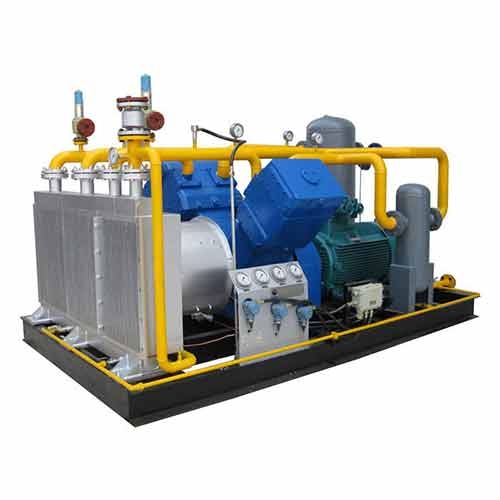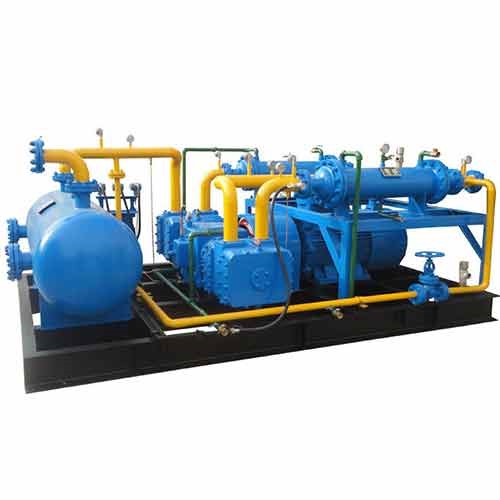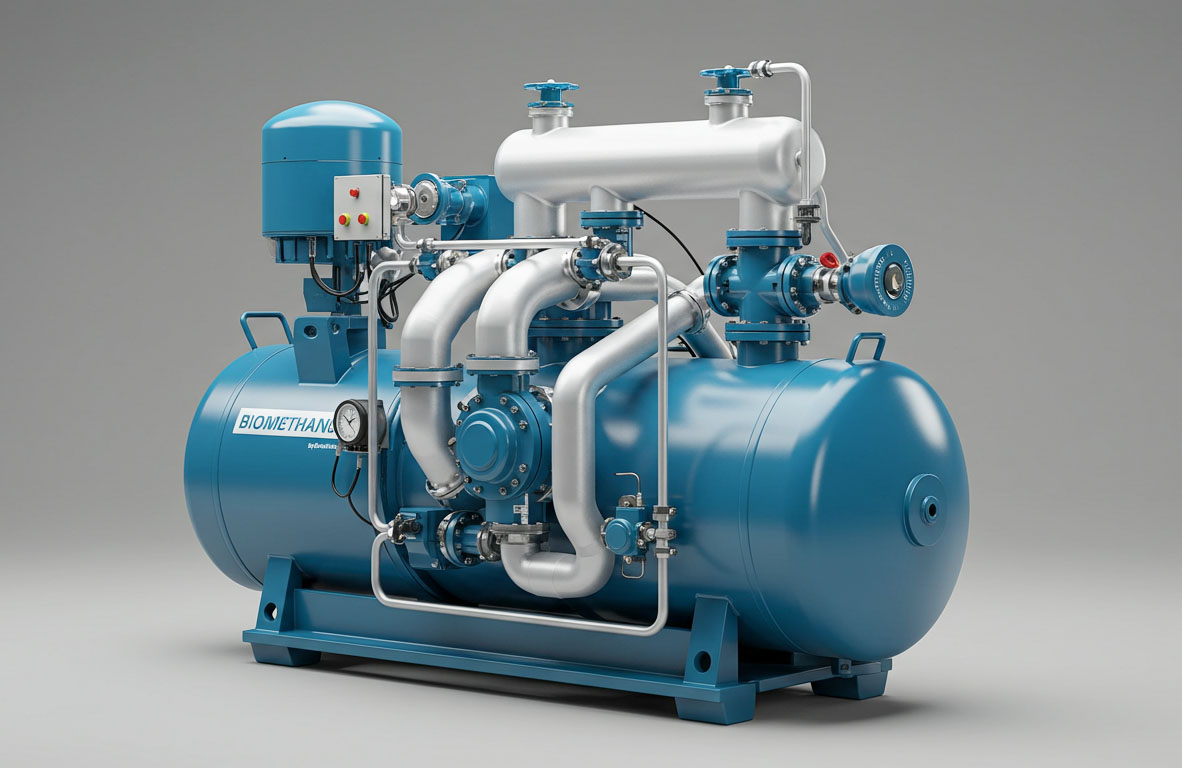Optimization and Applications of LPG Compressors in Modern Energy Systems
Liquefied Petroleum Gas (LPG) stands out as a versatile and eco-friendly fuel, widely employed in heating, cooking, and transportation. Its importance is underscored by its efficiency, portability, and reduced environmental footprint relative to other fossil fuels. The LPG Compressor assumes a pivotal role in the secure management and storage of LPG by pressurizing it, guaranteeing effective transportation and distribution, and mitigating the potential for leaks or accidents. These compressor units serve as indispensable elements within LPG infrastructure, facilitating the utilization of this invaluable energy source while emphasizing safety and environmental concerns.
Basic Principles of LPG Compressors
LPG compressors are indispensable devices employed to elevate the pressure of liquefied petroleum gas (LPG), enhancing its suitability for efficient storage, transit, and dispersal. These compressors adhere to fundamental principles and encompass diverse designs tailored to specific needs.
Foundations of LPG Compressor Operation
- Positive Displacement: Numerous LPG compressors employ positive displacement mechanisms, such as pistons or rotary vane systems. These mechanisms confine a precise LPG volume before compressing it, thereby elevating its pressure.
- Centrifugal: Alternatively, certain compressors harness centrifugal force to amplify LPG pressure. They impart significant velocity to the gas, converting its kinetic energy into pressure as it exits the impeller.
Varieties of LPG Compressors
Reciprocating Compressors: Employing pistons to compress LPG, these compressors are suitable for high-pressure applications and frequently find use in extensive LPG storage facilities.
Optimization Techniques for LPG Compressors
Optimizing LPG compressors is essential for enhancing their efficiency, minimizing wear and maintenance needs, and achieving superior performance. Several techniques can be employed to achieve these objectives:
Energy Efficiency Improvements
lVariable Speed Drives: Utilizing variable frequency drives allows compressors to adjust their speed according to demand, reducing energy consumption during periods of lower LPG demand.
lHeat Recovery: Capturing and reusing heat generated during compression can improve overall energy efficiency by providing useful thermal energy for other processes.
Reducing Wear and Maintenance Requirements
- Lubrication Systems: Implementing effective lubrication systems helps reduce friction and wear on compressor components, extending their lifespan and minimizing maintenance.
- Condition Monitoring: Employing advanced sensors and monitoring systems allows for real-time tracking of compressor performance, enabling predictive maintenance to address issues before they become critical.

Advanced Control Systems for Improved Performance
- Adaptive Control Algorithms: Implementing sophisticated control algorithms can optimize compressor operation by adjusting parameters based on real-time conditions, ensuring efficient and stable performance.
- Remote Monitoring and Control: Utilizing remote monitoring and control systems enables operators to manage compressors from a distance, optimizing performance and responding swiftly to changes or issues.
Applications of LPG Compressors
LPG Compressor has a wide range of applications across diverse industries, primarily for their essential function of boosting the pressure of liquefied petroleum gas (LPG). Notable applications encompass:
LPG Transportation
- Pipelines: Compressors are indispensable for maintaining the requisite pressure to efficiently transport LPG across lengthy pipeline networks.
- Ships: LPG carriers rely on compressors to pressurize and discharge LPG at ports and terminals.
- Trucks: LPG tanker trucks are equipped with compressors to ensure the secure and effective delivery of LPG to end-users.
LPG Storage
Underground and Above-ground Storage Facilities: Compressors are deployed to elevate LPG pressure, facilitating its storage in underground caverns, above-ground tanks, and various storage facilities, ensuring a consistent and dependable supply.
LPG Refining and Processing Plants
Within petroleum refining and processing plants, compressors are instrumental in managing LPG at different production stages. They assume a pivotal role in the separation, pressurization, and conveyance of LPG throughout the refining process.
Safety Considerations in LPG Compressor Operations:
Operating LPG compressors involves several safety considerations due to the potential hazards associated with handling liquefied petroleum gas. Here are key safety aspects:
Hazards Associated with LPG Compression
- Flammability: LPG is highly flammable, posing a fire and explosion risk if not handled properly.
- Toxicity: Inhaling LPG vapors can be harmful, necessitating precautions to prevent exposure.
- Pressure: High pressure in compressors can lead to equipment failure or leaks if not maintained correctly.
Safety Protocols and Best Practices
- Training: Properly trained personnel are crucial for safe compressor operation, including emergency response procedures.
- Equipment Maintenance: Regular inspection, maintenance, and compliance with safety standards are essential to prevent accidents.
- Ventilation: Adequate ventilation in compressor rooms helps disperse any potential gas leaks safely.
Monitoring and Alarm Systems
- Gas Detection: Installing gas detectors in compressor areas can provide early warning of leaks.
- Emergency Shutdown: Implementing automatic shutdown systems triggered by abnormal conditions enhances safety.
- Pressure Relief: Pressure relief devices are critical to release excess pressure and prevent over-pressurization.
Environmental Impact and Sustainability
Reducing the Carbon Footprint of LPG Compressors
- Enhancing energy efficiency in compressors through the adoption of energy-efficient models and variable-speed drives can significantly decrease energy consumption, resulting in reduced greenhouse gas emissions.
- Employing environmentally-friendly refrigerants in cooling systems is an effective strategy to mitigate the environmental impact of LPG compression.
Innovations to Foster Eco-Friendly Operations
- Ongoing research and development initiatives are dedicated to crafting compressors with lower emissions and enhanced efficiency, aligning with eco-conscious practices.
- Harnessing renewable energy sources to power compressors represents a sustainable approach, further diminishing their environmental footprint.
Sustainability Initiatives within the LPG Industry
- Prioritizing responsible sourcing of LPG feedstock entails capturing and repurposing gas that would otherwise be flared, bolstering sustainability efforts.
- Advocating for the utilization of LPG as a clean-burning fuel across diverse applications, including vehicle fleets and residential heating, aligns with sustainability objectives, reducing environmental impact.
CONCLUSION
In today’s energy systems, the optimization and utilization of the LPG Compressor are critical for efficiency, safety, and environmental stewardship. These adaptable tools play a central role in LPG’s transportation, storage, and processing, bolstering its status as a dependable and eco-friendly energy solution. Through the adoption of cutting-edge technologies, steadfast adherence to safety measures, and a commitment to sustainability, the LPG sector advances, diminishing its environmental impact and enriching the sustainability of our energy realm. Optimizing LPG compressors stands as a crucial stride toward a greener and more effective energy future.


